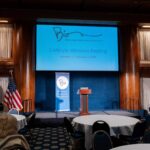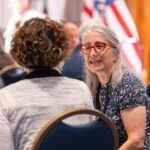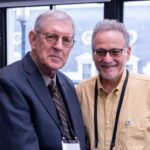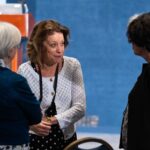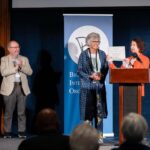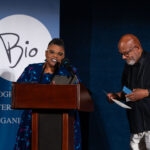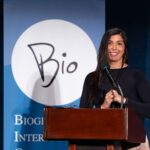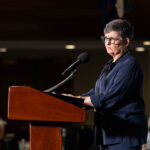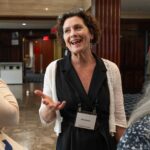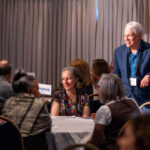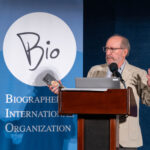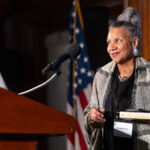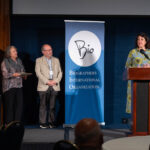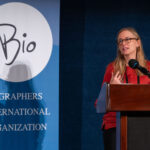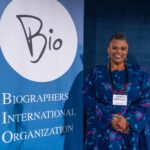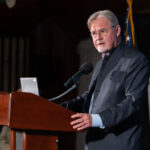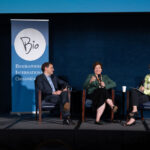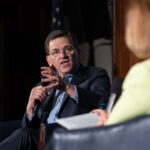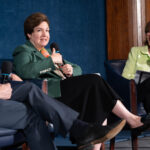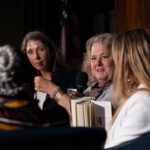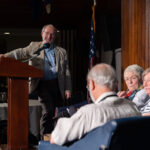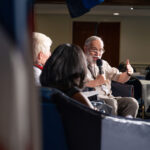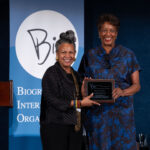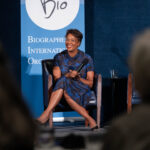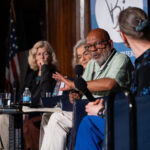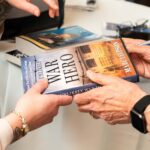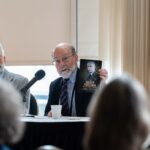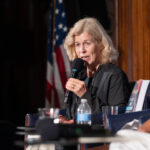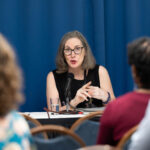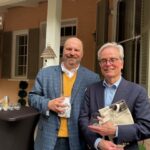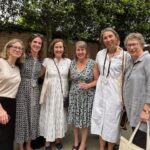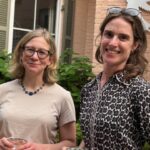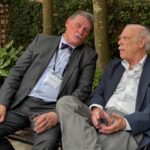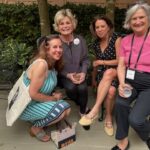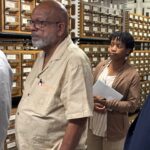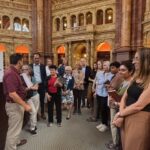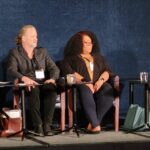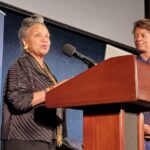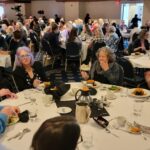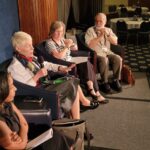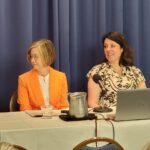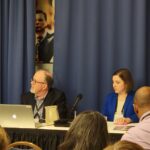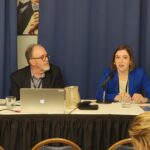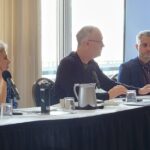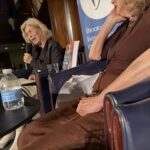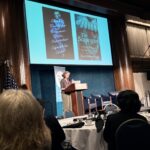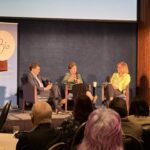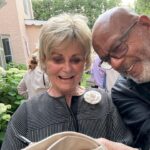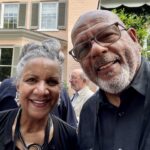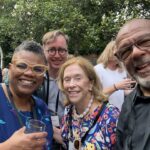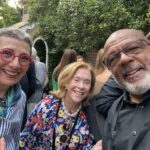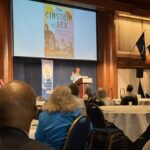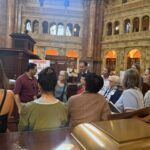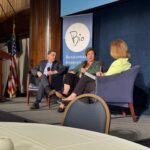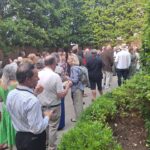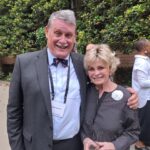⏴ Back to Past Confernces List
Biographers International Organization welcomed biographers, editors, agents, publishers, and publicity professionals to the 15th annual BIO Conference on June 5 and 6, 2025. BIO was honored to partner with The National Press Club in Washington, D.C., to host this event.
Panelists
James Ambuske is co-head of R2 Studios, the podcast division of the Roy Rosenzweig Center for History and New Media at George Mason University. He is the creator, writer, and narrator of “Worlds Turned Upside Down,” an in-depth, expertly produced podcast about the history of the American Revolution. He previously hosted the podcast, “Conversations at the George Washington Library” at Mount Vernon and frequently appears as a speaker and guest as the nation celebrates the 250th anniversary of the Revolution. He is a graduate of Miami University and has a Ph.D. in history from the University of Virginia.
Lauren Arrington is the recipient of an NEH Public Scholar Award, the Robert & Ina Caro Award from BIO, and a visiting fellowship from the New York Public Library to support her group biography of women artists working for the WPA, forthcoming with St Martin’s Press. She is the author of two previous group biographies, The Poets of Rapallo (Oxford, 2021) and Revolutionary Lives (Princeton, 2016). She is chair and professor of English at the University of South Florida.
Kai Bird is a Pulitzer Prize-winning historian who has published biographies of John J. McCloy, McGeorge Bundy, J. Robert Oppenheimer, Robert Ames—and most recently The Outlier: The Unfinished Presidency of Jimmy Carter. He has also authored a memoir about his childhood in the Middle East. He is the director of the Leon Levy Center for Biography at the Graduate Center of the City University of New York. His next book is a biography of Roy Cohn. His biography of Oppenheimer, American Prometheus, co-authored with the late Martin J. Sherwin, was the inspiration for Christopher Nolan’s film, Oppenheimer.
Madeleine Blais won a Pulitzer Prize for her journalism at Tropic Magazine of the Miami Herald. She is a professor emerita in the Journalism Department at the University of Massachusetts and the author of The Heart Is an Instrument (a collection of essays), In These Girls Hope Is a Muscle (finalist for the National Book Critics Circle award in nonfiction), Uphill Walkers: Memoir of a Family, To the New Owners: A Martha’s Vineyard Memoir, and Queen of the Court: The Many Lives of Tennis Legend Alice Marble. Her current project is set in Miami in the 1980s.
Nicholas Boggs is the author of Baldwin: A Love Story, forthcoming from Farrar, Straus and Giroux in August 2025. He rediscovered and co-edited Baldwin’s collaboration with French artist Yoran Cazac, Little Man, Little Man: A Story of Childhood (2018).
James Bradley is the author of Martin Van Buren: America’s First Politician, published by Oxford University Press. He is also the co-editor of the Martin Van Buren Papers and the editor of the forthcoming Selected Papers of Martin Van Buren. Bradley also teaches documentary editing in the public history program at the State University of New York at Albany and was the senior project editor of The Encyclopedia of New York City.
Ashley Brown is the author of Serving Herself: The Life and Times of Althea Gibson. Serving Herself has received the Shapiro Book Prize from the Huntington Library’s Shapiro Center for American History and Culture, the Association of Black Women Historians’ Letitia Woods Brown Book Prize, the Popular Culture Association’s Harry Shaw and Katrina Hazzard-Donald Award, and the United States Golf Association’s Herbert Warren Wind Book Award. Brown is an associate professor and the Allan H. Selig Chair in the History of Sport and Society at the University of Wisconsin-Madison, where, among many other courses, she teaches Biography in U.S. Sports History.
A’Lelia Bundles is the author of Joy Goddess: A’Lelia Walker and the Harlem Renaissance, the first major biography of her great-grandmother, and of On Her Own Ground: The Life and Times of Madam C.J. Walker, a New York Times Notable Book about her entrepreneurial great-great-grandmother. She is the founder of the Madam Walker Family Archives, serves on several nonprofit boards, including Columbia Global Reports and the Schlesinger Library on the History of Women in America at Harvard Radcliffe Institute, and is a former ABC News executive, and Emmy Award-winning NBC News producer.
Barbara Burkhardt is professor emerita of English at the University of Illinois Springfield and author of William Maxwell: A Literary Life (University of Illinois Press, 2005), which plumbs Maxwell’s highly autobiographical fiction and his long career as fiction editor at The New Yorker. Burkhardt is also the editor of Conversations With William Maxwell (University Press of Mississippi, 2012, 2024). She is currently working on a biography of American author, singer, humorist, and radio personality Garrison Keillor.
Lindsay Chervinsky is a presidential historian and executive director of the George Washington Presidential Library at Mount Vernon. Her latest book, Making the Presidency: John Adams and the Precedents That Forged the Republic, was published in September 2024 by Oxford University Press. Chervinsky also authored the award-winning book The Cabinet: George Washington and the Creation of an American Institution and co-edited Mourning the Presidents: Loss and Legacy in American Culture. She has written for media outlets including The Washington Post, Time, CNN.com, and The Wall Street Journal, and starred in many podcasts, appearing often on “Listening to America” with Clay Jenkinson.
Ann Chaitovitz spent over 30 years in domestic and international copyright law, most recently at the USPTO’s Office of Policy and International Affairs. She was the first U.S. IP attaché in Lima, Peru, covering Bolivia, Chile, Colombia, Ecuador, and Peru. Ann served as executive director of the Future of Music Coalition, addressing issues at the intersection of music, law, technology, and policy. She was also national director of sound recordings at AFTRA and previously worked as a staff attorney at ASCAP, supporting songwriters and publishers. Her career focused on advancing intellectual property rights and creative industry advocacy.
Andrew S. Curran is the author of the forthcoming The Race Makers – a group biography moving from Louis XIV to Thomas Jefferson. Previous books include Who Is Black and Why?, co-authored with Henry Louis Gates, Jr., The Anatomy of Blackness, and Diderot and the Art of Thinking Freely, named a best book of the year by Kirkus Reviews and other outlets. He has also written for The New York Review of Books, The New York Times, The Guardian, Time, and The Paris Review. Curran is a fellow at the New York Academy of Medicine and the William Armstrong Professor of the Humanities at Wesleyan. His next project, entitled Good Beyond Belief, is a group biography on the history of atheism written in collaboration with Dennis C. Rasmussen.
Vincent DiGirolamo is associate professor of history at Baruch College and author of Crying the News: A History of America’s Newsboys (Oxford University Press, 2018), winner of the Turner, Taft, Mott, Palmegiano, and DeSantis prizes in history. His work has appeared in Time magazine, the London Times, and The San Francisco Examiner-Chronicle. His latest essay, “Slaves in the Salon: The Underside of Julius LeBlanc Stewart’s Belle Epoque,” examines the American-born artist’s centuries-long family involvement in Cuban sugar slavery. It was published in The Sweet Life: Julius LeBlanc Stewart and Painting the Belle Epoque (Giles, 2024). DiGirolamo is currently writing a biography of Gilded Age radical journalist John Swinton.
Kirstin Downey began her career in journalism and in 1988 began writing for The Washington Post, where she continued working until she began studying economic history at Harvard University. Downey won awards for her coverage of the aftermath of the savings-and-loan debacle, and she was among Washington Post staff members who received a Pulitzer Prize. Her biography of Frances Perkins, The Woman Behind the New Deal, was named one of the best nonfiction books of 2009 by the Library of Congress, the ALA, and NPR. Her next book, Isabella, received a starred review from Kirkus Reviews.
Natalie Dykstra is the author of Clover Adams: A Gilded and Heartbreaking Life, which won a NEH Fellowship and was a finalist for the 2013 Massachusetts Book Award. For Chasing Beauty: The Life of Isabella Stewart Gardner, she received a NEH Public Scholars grant and the inaugural Robert and Ina Caro Travel Fellowship from BIO. Chasing Beauty won this year’s Marfield Prize, the national award for arts writing. She was a co-organizer of the inaugural 2023 Biography Lab and is an emerita professor of English at Hope College. She lives near Boston.
Ashley Farmer is a historian of Black women’s history, intellectual history, and radical politics. Her book Remaking Black Power: How Black Women Transformed an Era is the first comprehensive study of Black women’s intellectual production and activism in the Black Power era. Her next book, Queen Mother Audley Moore: Mother of Black Nationalism, will be the first biography of one of the most influential yet understudied activists and thinkers of the 20th century, Audley Moore. Moore’s life and activism from 1898 to 1997 reveals how she was an important but overlooked progenitor of Black Nationalist thought and activism.
John A. “Jack” Farrell is the author of Richard Nixon: The Life, which won the PEN America award for the best biography and the New-York Historical Society book prize for the best volume of American history of 2017. It was also a finalist for the Pulitzer Prize. His 2022 book, Ted Kennedy: A Life, made the top 10 list of finalists for the National Book Award. Farrell is a University of Virginia graduate and has a Ph.D. in history from the University of Groningen in the Netherlands. In 2001 he published Tip O’Neill and the Democratic Century, which won the Hardeman prize for the best book on Congress. His book Clarence Darrow: Attorney for the Damned won the Los Angeles Times book award for best biography of 2012.
Danny Fingeroth is a biographer and cultural historian. His 2023 book, Jack Ruby: The Many Faces of Oswald’s Assassin (Chicago Review Press), examines this bizarre figure who changed history with his 1963 murder of the accused JFK assassin on live TV. Fingeroth’s 2019 biography A Marvelous Life: The Amazing Story of Stan Lee (St. Martin’s Press/Macmillan), looks closely at the controversial co-creator of Marvel Comics. Fingeroth has served as executive editor at Marvel and other companies, spoken and taught at venues including the Smithsonian, Columbia University, and the Bob Dylan Conference, and appeared on NBC’s Today Show and NPR’s All Things Considered.
Samuel G. Freedman is an award-winning author, professor, and journalist. He has written 10 acclaimed books, winning the Hillman Prize for Book Journalism for his most recent, Into the Bright Sunshine: Young Hubert Humphrey and the Fight for Civil Rights. His previous books have been finalists for the National Book Award and the Pulitzer Prize and have received the New York Public Library Helen M. Bernstein Award for Excellence in Journalism and the National Jewish Book Award. As a professor at Columbia Journalism School, Freedman has been named the nation’s Outstanding Journalism Educator by Sigma Delta Chi. His course in book-writing has produced more than 110 authors, editors, and agents.
Major Garrett is the chief Washington correspondent for CBS News. As a White House correspondent, he has covered the presidential administrations of Bill Clinton, George W. Bush, Barack Obama, and Donald Trump. As the author of five books on American politics, and as a former congressional and White House correspondent for National Journal magazine, he knows his way around a keyboard as well. A California native, he is a graduate of the University of Missouri journalism school. He conceived and began hosting his trailblazing podcast, “The Takeout,” about politics, policy, and pop culture in 2017, before podcasting was cool. He was also the host of “Agent of Betrayal: The Double Life of Robert Hanssen,” a multipart podcast investigation into the most damaging spy in FBI history.
Allison Gilbert is an Emmy Award-winning journalist and a contributor to The New York Times. She is the author and co-author of numerous books, including Listen, World!, the first biography of Hearst newspaper columnist Elsie Robinson, winner of the 2023 Northern California Book Award. Gilbert’s essay for CNN about the reporting obstacles she overcame uncovering Robinson’s life story won the 2024 New York Press Club’s Journalism Award for Best Opinion Writing. She is co-author with Dr. Ruth Westheimer of The Joy of Connections: 100 Ways to Beat Loneliness and Live a Happier and More Meaningful Life, released two months after the American icon passed away.
Maryemma Graham, 2021 recipient of an American Book Award for Lifetime Achievement, is author/editor of 15 books and exhibition catalogs. The Cambridge History of African American Literature, Teaching African American Literature: Theory and Practice, and the translingual Toni Morrison: Au delà du visible ordinary/Beyond the Visible and Ordinary complement her funded initiative: the History of Black Writing. Founded in 1983, this leading research center for literary recovery and archival preservation employing interactive/digital technologies has redefined the field of Black literary studies. Graham’s The House Where My Soul Lives: The Life of Margaret Walker (Oxford), is the first complete biography of the 20th writer and institution builder. Graham is University Distinguished Professor Emerita at the University of Kansas.
Lauren Harper is Freedom of the Press Foundation’s first Daniel Ellsberg Chair on Government Secrecy, a position established to honor and continue the legendary whistleblower’s fight for secrecy reform. Her work highlights how excessive government secrecy prevents the public from meaningfully participating in self-government in every area that secrecy permeates, from public health to foreign policy. She advocates for commonsense improvements to the classification system, reforms to the Freedom of Information Act, and increased government accountability. Harper previously served as the public policy director for the National Security Archive in Washington, D.C., helping researchers get historically significant government documents declassified.
Nancy Isenberg is the T. Harry Williams Professor of History at Louisiana State University. Her 2016 book, White Trash: The 400-Year Untold History of Class in America, was a New York Times bestseller. Her books about U.S. presidents include Madison and Jefferson (2013) and The Problem of Democracy: The Presidents Adams Confront the Cult of Personality (2019), both written with Andrew Burstein.
Danielle Amir Jackson is a writer and critic born in Memphis. Her essays on music, film, and books appear in The New York Times, The Atlantic, The American Scholar, and other publications. From 2020-2024, she was editor-in-chief of the Oxford American. She is currently at work on her first book, Honey’s Grill, a cultural history of women-helmed spaces and the evolution of the blues.
Sabrina Jones creates comics and graphic novels on social justice and radical history. Her books include Race to Incarcerate, and Our Lady of Birth Control: A Cartoonist’s Encounter with Margaret Sanger. She has created graphic biographies of Isadora Duncan, Jane Jacobs, Walt Whitman, FDR, Peace Pilgrim, and Jesus. She began cartooning in the political comics magazine World War 3 Illustrated, and has continued to edit and contribute to many issues, including the recent, My Body/Our Rights.
Eve M. Kahn is writing the forthcoming biography (due this fall from Fordham University Press) of the reformer and journalist Zoe Anderson Norris (1860-1914), who published reams of lies mixed with raw confessional soul-baring. In some writings, for instance, Norris claimed to have grown up in Kentucky plantation splendor, but other works reveal her childhood’s grinding poverty that fostered her sympathy for New York’s poorest immigrants. The 19th-century painter Mary Rogers Williams, subject of Kahn’s 2019 book (Wesleyan University Press), mostly told the truth while trying to ensure that many truths (including her sexual orientation) stayed secret.
Carla Kaplan, Davis Distinguished Professor of American Literature at Northeastern University, has published seven books, including Miss Anne in Harlem: The White Women of the Black Renaissance, and Zora Neale Hurston: A Life in Letters, both New York Times Notable Books. Her biography of Jessica Mitford is forthcoming from HarperCollins in 2025. Kaplan chairs the Signs editorial board, founded Northeastern’s Humanities Center, has held fellowships from the NEH Public Scholars, the Guggenheim Foundation, Cullman Center, DuBois Institute, Schomburg Center, New England Regional Fellowship Consortium, and elsewhere, is on the BIO board, and is a Society of American Historians fellow.
Dara Kaye has been at WME since 2023. She represents adult nonfiction that tells great stories, from biography and history to science, parenting, and memoir. Her clients include New York Times bestsellers and winners of awards from the Locus to PEN America, Fulbright, and NEH fellowships. She especially loves working with academics, journalists, and other experts with a knack for communicating original research to mainstream audiences. Before joining WME, Kaye was an agent and foreign rights director at the Ross Yoon Agency. A graduate of Smith College (B.A.) and University College London (M.A.), she lives in Washington, D.C., with her husband and children.
Kitty Kelley is the author of seven No. 1 New York Times bestselling biographies: Oprah: A Biography (2010), The Family: The Real Story of the Bush Dynasty (2004), The Royals (1997), Nancy Reagan: The Unauthorized Biography (1991), His Way: The Unauthorized Biography of Frank Sinatra (1986), Elizabeth Taylor: The Last Star (1981), and Jackie Oh! (1978). She also wrote two books about Stanley Tretick’s photographs and a children’s book, Martin’s Dream Day (2017). Kelley has received many honors from her peers, including the 2005 PEN Oakland/Gary Webb Anti-Censorship Award, the 2014 Founders’ Award from the American Society of Journalists and Authors, and, most recently, the 2023 BIO Award.
David A. Langbart works in Research Services at the U.S. National Archives. He has over 45 years of experience appraising, processing, describing, and performing reference service on government records. He is the senior specialist on the records of the foreign affairs agencies and has significant familiarity with the records of the national level intelligence agencies, the Federal Bureau of Investigation, and the Executive Office of the President. In 2021 he received the first-ever Anna K. Nelson Prize for Archival Excellence of the Society for Historians of American Foreign Relations (SHAFR).
Heath Hardage Lee is an award-winning historian, biographer, and curator. Lee’s narrative nonfiction book The League of Wives: The Untold Story of the Women Who Took on the U.S. Government to Bring Their Husbands Home From Vietnam (St. Martin’s Press, 2019) is currently being developed as a television series. Her new book, The Mysterious Mrs. Nixon: Washington’s Most Private First Lady, is the first commercial biography of First Lady Pat Nixon in almost 40 years. She currently serves on the boards of the First Ladies Association for Research and Education and Biographers International Organization.
Adam Leslie is the co-founder and CEO of Real Spy Comics, which has exclusive access to never-before-told stories from real-life spies, clandestine agents, and covert operators. He is director of the Washington office of the Australian Strategic Policy Institute, with more than 30 years of experience spanning national security, defense, and diplomacy. He was a national security professional with the Australian government. where he led multidisciplined teams to address Asia-Pacific regional security issues, and was the founder of OTX International, a 501(c)(3) not-for-profit established while he and his team were exfiltrating at-risk Afghans being targeted by the Taliban.
Gail Levin is Distinguished Professor of art history, American studies, and women’s studies at Baruch College and the Graduate Center of the City University of New York. An acknowledged authority on American painter Edward Hopper, she has curated landmark exhibitions, written many books, including Hopper’s catalogue raisonné; definitive first biographies of Hopper, Lee Krasner, and Judy Chicago; studies on Aaron Copland, Synchromism, and abstract expressionism; essays on theory of biographies of artists and ethics in the visual arts; and articles on modern and contemporary art ranging from the Stieglitz circle to American, Asian, and Jewish feminist artists.
Aidan Levy is the author of Saxophone Colossus: The Life and Music of Sonny Rollins (Hachette Books, 2022), which won an American Book Award from the Before Columbus Foundation and the Jazz Journalists Association Jazz Award for Biography/Autobiography of the Year and was longlisted for the PEN/Jacqueline Bograd Weld Award for Biography. He began work on the book as a Leon Levy Center for Biography fellow. He is the author of Dirty Blvd.: The Life and Music of Lou Reed and editor of Patti Smith on Patti Smith: Interviews and Encounters.
Andrew Maraniss is a New York Times bestselling author of sports and social justice nonfiction for adults, teens, and children. His books have received the RFK Book Award, Lillian Smith Book Award, and Sydney Taylor Honor Award; been named to the ALA’s Rainbow Book List and RISE Feminist Book List; and named to Esquire’s 100 Best Baseball Books Ever Written. Maraniss is director of special projects at the Vanderbilt University athletic department, where he manages the university’s Sports & Society Initiative. He lives in Nashville with his wife and two children.
Megan Marshall is the author, most recently, of the essay collection After Lives: On Biography and the Mysteries of the Human Heart. Her biography Margaret Fuller: A New American Life was awarded the 2014 Pulitzer Prize in Biography. The Peabody Sisters: Three Women Who Ignited American Romanticism won the Francis Parkman Prize, the Mark Lynton History Prize, and was a finalist for the Pulitzer Prize. Elizabeth Bishop: A Miracle for Breakfast is a genre-blurring biography-cum-memoir of her poetry professor at Harvard College in the 1970s. She is the Charles Wesley Emerson College Professor at Emerson College and a recipient of the BIO Award.
Marcus J. Moore is the critically acclaimed author of The Butterfly Effect: How Kendrick Lamar Ignited the Soul of Black America (Atria, 2020) and High and Rising: A Book About De La Soul (Dey Street, 2024). Moore writes about jazz and other experimental music for various outlets and has curated concerts and interview programming in Washington, D.C., and New York City.
Joseph M. Moxley is the founder of Writing Commons and a professor of English at the University of South Florida. He has written, coauthored, or edited numerous works, including a novel, 14 nonfiction books, and 37 articles in peer-reviewed journals. Moxley has self-published numerous articles at Writing Commons, an open education resource (OER) designed to support writing teachers, students, professional writers, and the broader public. The project, which provides free and accessible content on writing, has been accessed by more than 15 million users worldwide.
Marnie Mueller, award-winning novelist, is accustomed to fabricating lives/lies in her fiction, but met her match in writing The Showgirl and the Writer: A Friendship Forged in the Aftermath of the Japanese American Incarceration (Peace Corps Writers, 2023). This hybrid memoir/biography explores the convergences between Mary Mon Toy, a Nisei performer, and Mueller’s own life history as a Caucasian born in the Tule Lake Japanese American High Security Segregation Camp. Mon Toy challenged Mueller’s nonfiction skills, in recreating herself as a Chinese American performer in order to wipe out her ethnicity and incarceration as Japanese American in post WWII America.
Alec Nevala-Lee is the author of Inventor of the Future: The Visionary Life of Buckminster Fuller, which was included on Esquire‘s list of the 50 best biographies of all time, and the Hugo Award finalist Astounding: John W. Campbell, Isaac Asimov, Robert A. Heinlein, L. Ron Hubbard, and the Golden Age of Science Fiction. His biography of the physicist Luis W. Alvarez, Collisions, will be published by W. W. Norton this month. He was a juror for the 2024 Pulitzer Prize for Biography and recently participated in The New York Times’ survey of the best books of the 21st century.
Roger K. Newman is professor emeritus of the Columbia University Graduate School of Journalism and the author of Hugo Black: A Biography (Pantheon, 1994), a finalist for the 1995 Pulitzer Prize. The most liberal and influential U.S. Supreme Court justice of the 20th century, Black’s legal career was nearly derailed shortly after his appointment by Franklin Roosevelt in 1937 by exposés of his membership in the Ku Klux Klan as a young lawyer in Alabama. Newman has also taught constitutional Law at New York University and is editor of The Yale Biographical Dictionary of American Law (Yale University Press, 2009). He is now working on a book on the Supreme Court and the conservative movement.
Tim E. Ogline, a Philadelphia-based writer, illustrator, and design professional, teaches at Moore College of Art & Design and has taught previously at the Tyler School of Art, as well. He co-wrote and illustrated the acclaimed graphic nonfiction title We Survived the Holocaust as well as writing and illustrating the recently published The Way to Wealth: Benjamin Franklin on Matters of Money and Lessons on Livelihood. His award-winning design practice serves prominent clients, while his illustrations have appeared in major publications including The Wall Street Journal, Institutional Investor, The Philadelphia Inquirer, and the Utne Reader, among others.
Christian F. Ostermann, an award-winning historian, is the founding director of the History and Public Policy Program at the Wilson Center, which brings historical context to international public policy issues. He oversees the Center’s Cold War International History Project, co-directs the Nuclear Proliferation International History Project and its Nuclear History Boot Camp, and the Cold War Archival Research Institute. He created the North Korea International Documentation Project, which documents North Korean politics and foreign policy. Under his leadership, the Center launched the global archival platform Digital Archive—International History Declassified, winner of the American Historical Association’s 2013 Roy Rosenzweig Prize.
Alison Owings, journalist/oral historian, is the author of Mayor of the Tenderloin: Del Seymour’s Journey From Living on the Streets to Fighting Homelessness in San Francisco (Beacon), called “a memorable biography… both entertaining and life-affirming” (Booklist) and “a richly satisfying tapestry” (San Francisco Chronicle). Her previous books include Frauen: German Women Recall the Third Reich (Rutgers), a New York Times Notable Book; Hey, Waitress! The USA From the Other Side of the Tray (California); and Indian Voices: Listening to Native Americans (Rutgers). Different subjects, same questions: Have falsehoods swept into the interviews? What to do with whoppers (“Hitler did not know what went on in the camps”) or deflection (“my memory fails”)? Is the chaff as compelling as the wheat?
Susan Page is the best-selling author of three biographies of formidable women—Barbara Bush (The Matriarch), Nancy Pelosi (Madam Speaker), and Barbara Walters (The Rulebreaker). She’s also the Washington bureau chief of USA Today. A native of Wichita and graduate of Northwestern and Columbia, she has won every journalism award given specifically for coverage of the White House. She has covered the past 12 presidential campaigns and interviewed the past 10 presidents (three after they had left office). She also moderated the 2020 vice presidential debate between Mike Pence and Kamala Harris. Yes, that was the one with the fly.
Steve Paul spent more than 40 years in daily journalism and is now, as an independent scholar, devoted to literary biography. He is a former board member of the National Book Critics Circle, an active member of the Ernest Hemingway Society, and currently president of Biographers International Organization. He co-edited a collection of scholarly essays on Ernest Hemingway’s early life and writings and is the author of Hemingway at Eighteen and Literary Alchemist: The Writing Life of Evan S. Connell. He is currently at work on a biography of the poet William Stafford.
Tamara Payne is a Pulitzer Prize-winning co-author of The Dead Are Arising: The Life of Malcolm X, written with her father, the Pulitzer Prize-winning journalist Les Payne, and published by Liveright.
Judith Pearson is a bestselling author, an accomplished presenter, and a graduate of Michigan State University. But her favorite title is “story teller,” with a little “research junkie” thrown in. Those characteristics have resulted in six biographies, including a bestseller and award-winners. An accomplished presenter, Pearson has turned her books’ subjects into presentations viewed by thousands in the U.S. and the U.K. She was named one of Chicago’s Most Inspirational Women by Chicago Magazine, selected as a finalist for the Arizona Healthcare Leadership Awards, and named a Phoenix Healthcare Hero. Pearson and her husband live in Nokomis, Florida.
Prudence Peiffer is an art historian, writer, and director of content at the Museum of Modern Art. Her book The Slip: The New York City Street That Changed American Art Forever (2023) won the New York City Book Award, was shortlisted for the Plutarch Award for best biography, was a New York Times Notable Book of the Year, and was longlisted for the National Book Award, among other accolades.
Victoria Phillips is the author of Martha Graham’s Cold War, which took her to archives internationally. It will be republished in Russian in 2027. She is a global fellow at the Wilson Center, a lecturer at the CUNY program in Biography and Memoir, and a fellow at the Oxford University Centre for Life Writing to complete a biography of Eleanor Lansing Dulles. Since 2013, she has co-directed the Cold War Archival Research Institute, which trains young scholars in cooperative methods of global research, and is the co-founder of the Global Biography Working Group.
Mimi Pond is from San Diego and attended the California College of Arts and Crafts. In the 1980s, as a cartoonist and illustrator, she produced five humor books, including The Valley Girls’ Guide to Life. Now living in L.A., she continues to create comics for magazines and websites. Her 2014 graphic novel, Over Easy, a fictionalized account of her ’70s waitressing career, published by Drawn & Quarterly, was on the New York Times bestseller list, and won a PEN Award. She followed it up with 2017’s acclaimed The Customer Is Always Wrong. Her graphic biography of Britain’s storied Mitford sisters, Do Admit: The Mitford Sisters and Me, will be published in fall 2025 by D&Q.
Nicholas Reynolds, after receiving a Ph.D. from Oxford in 1970, joined the Marine Corps, serving as an infantry officer and then as an officer in charge of field history, deploying historians globally. He then worked at CIA, most recently as the historian for the CIA Museum, where he drafted the strategic plan for the next decade and wrote a foundational monograph. He still believes he has held the best two niche jobs in the U.S. government. Leveraging his experience, he has taught at the Naval War College, Johns Hopkins University, and the Osher Lifelong Learning Institute.
David Robarge received his Ph.D. in American history from Columbia University and worked for David Rockefeller before joining the CIA in 1989. Robarge moved to the CIA History Staff in 1996 and was appointed chief historian of the CIA in 2005. His biography of Director of Central Intelligence John McCone was recently declassified, along with his most recent biography of General George Marshall. His articles and book reviews on CIA leaders have appeared in renowned journals.
Rebecca Boggs Roberts is an award-winning educator, author, and speaker, Her most recent book is Untold Power: The Fascinating Rise and Complex Legacy of First Lady Edith Wilson. Other books include the award-winning The Suffragist Playbook: Your Guide to Changing the World; Suffragists in Washington, D.C.: The 1913 Parade and the Fight for the Vote; and Historic Congressional Cemetery. She is currently deputy director of events at the Library of Congress and has previously worked as a journalist, producer, tour guide, forensic anthropologist, event planner, political consultant, jazz singer, and radio talk show host.
Carl Rollyson is a prolific biographer and a professor of journalism at Baruch College. He has written biographies of William Faulkner, Marilyn Monroe, Norman Mailer, and Thurgood Marshall, among many other figures in the world of literature, politics, and the arts. His forthcoming book, Making the American Presidency: How Biographers Shape History, will be published by the University of Virginia Press.
Gail Ross represents important commercial nonfiction across all genres. She co-founded the Washington D.C., office of WME in 2023. Prior to joining WME, she operated the Gail Ross Literary Agency, which became the Ross Yoon Agency in 2010. Washingtonian magazine has named her one of the most powerful women in Washington for several years running. Ross is also the author of The Writer’s Lawyer and The Essential Guide to Entertainment Law’s chapter on book publishing contracts. She speaks widely about publishing and book contracts across the country. Her daily mantra is: Books Change Lives.
Giovanni Russonello is a writer, editor, educator, and organizer working at the intersection of music, politics, and U.S. history. His work critically interrogates establishment wisdom and suppressed histories, especially around the guiding role that jazz and Black music have played in American society. Russonello is the only person to have served as both a politics columnist and a music critic for The New York Times. A 2024 DC Commission on the Arts & Humanities fellow and an adjunct professor at NYU, he also edits capitalbop.com, a web magazine covering the Washington, D.C., jazz scene, and is working on a book about Gil Scott-Heron and D.C. in the 1970s and ’80s (due out in 2026 from Metropolitan Books/Macmillan and Faber & Faber).
Emily Setina teaches 20th- and 21st-century American literature at the University of Nevada, Las Vegas. She is co-editor of the forthcoming Oxford Handbook of Gertrude Stein and author of The Writer in the Darkroom: Photography and Biography in Virginia Woolf, Gertrude Stein, and Marianne Moore, also forthcoming from Oxford University Press. With Susannah Hollister, she is currently at work on a co-authored biography of New York School poet and teaching pioneer Kenneth Koch. Their previous collaboration was a critical edition of Stein’s long poem “Stanzas in Meditation.”
Mark Silver is a senior program officer at the National Endowment for the Humanities, where his responsibilities include overseeing the Public Scholars program and chairing review panels in the Fellowships program, the Summer Stipends program, and other programs supporting research in the humanities and social sciences. He holds a Ph.D. in East Asian languages and literatures from Yale University. He is the author of Purloined Letters: Cultural Borrowing and Japanese Crime Literature, 1868-1937 (University of Hawaii Press, 2008) as well as book reviews, peer-reviewed articles, and translations in the fields of modern Japanese literature and culture.
Peter Slevin is a contributing writer for The New Yorker, based in Chicago. He has spent much of his career writing for newspapers, spending seven years in Europe for The Miami Herald and a decade on the national staff of The Washington Post, where he wrote about foreign policy and later traveled the country with an eye to politics and stories between the coasts. His portrait of Michelle Obama—Michelle Obama: A Life—was a finalist for the PEN America biography prize and rated as one of Booklist’s top 10 biographies of the year. He teaches at Northwestern University’s Medill School of Journalism.
Sunny Stalter-Pace is the Hargis Professor of American Studies at Auburn University. She wrote Imitation Artist: Gertrude Hoffmann’s Life in Vaudeville and Dance, published with Northwestern University Press in 2020. Her current research project is a cultural history of the New York Hippodrome. She has received fellowships from the New York Public Library, the Harry Ransom Center for the Humanities, and Wake Forest University. She has published extensively on popular performance and New York City.
Jared Stearns is a San Francisco-based writer. His work has appeared in The Boston Globe, San Francisco Chronicle, Cineaste, The Dark Side, and The San Franciscan, among others. His first book, Pure: The Sexual Revolutions of Marilyn Chambers, was published by Headpress in 2024. He is a graduate of Emerson College in Boston.
Will Swift is a biographer, a historian, and a practicing clinical psychologist. His Pat and Dick: The Nixons, An Intimate Portrait of a Marriage (2014) was short-listed for the Plutarch Award and was a New York Times Editor’s Choice. His previous books are The Roosevelts and the Royals (2004) and The Kennedys Against the Gathering Storm (2008). Swift is a founding Board member, a current Board member, and a past president of BIO. He particularly enjoys discovering facts which help repair historical reputations.
John Troutman is curator of music and musical instruments at the Smithsonian’s National Museum of American History. His books include Kīkā Kila: How the Hawaiian Steel Guitar Changed the Sound of Modern Music and Indian Blues: American Indians and the Politics of Music, 1879-1934. His edited edition of Robert “Mack” McCormick’s Biography of a Phantom: A Robert Johnson Blues Odyssey, received an end-of-year New York Times Critics Pick of 2023, made Kirkus Reviews’ list for Best Biographies of 2023, and was the winner of Living Blues magazine’s Critics Poll for Best Blues Book of 2023.
Marissa Vassari is the archivist and educator in the Research and Education division of the Rockefeller Archive Center (RAC). She has presented at the Mid-Atlantic Regional Archives Conference, was invited to conduct the RAC World War II Refugee Scholars Workshop at the New School for Social Research and Parsons Paris’ International Symposium in Exile: Intellectuals, Artists, and Universities, and has published an article about developing policies and procedures for temporary exhibits in archives in Collections: A Journal for Museum and Archives Professionals. In 2016, she founded the Archival Educators Roundtable, which facilitates communication among professionals who use primary sources in public outreach and teaching.
Gayle Wald is professor of American studies at George Washington University. She has written two biographies: This is Rhythm: Ella Jenkins, Children’s Music, and the Long Civil Rights Movement (University of Chicago Press, 2025) and Shout, Sister, Shout! The Untold Story of Rock-and-Roll Trailblazer Sister Rosetta Tharpe (Beacon Press, 2007, 2023). The Tharpe book inspired a documentary (Godmother of Rock) as well as a musical (Shout, Sister, Shout!), produced most recently at Ford’s Theatre in Washington, D.C. It is often cited as a spur to Tharpe’s 2018 induction into the Rock & Roll Hall of Fame.
Susan Ware is the author of numerous biographies of twentieth-century American women, including Amelia Earhart, Molly Dewson, Mary Margaret McBride, and Billie Jean King, as well as two collective biographies. She was the general editor of Notable American Women: Completing the Twentieth Century from 1997-2004 and of American National Biography from 2012-2022. She has served on the selection committees for the Bancroft Prize, the Francis Parkman Prize, and BIO’s Plutarch Award and was a co-founder of the New England Biography Seminar at the Massachusetts Historical Society.
Eric K. Washington is a historian, author, and BIO board member. His 2019 biography, Boss of the Grips: The Life of James H. Williams and the Red Caps of Grand Central Terminal (Liveright), was lauded as “an illuminating chronicle” (Edward Kosner, Wall Street Journal) that invoked “a fitting exemplar of Harlem’s ambitious Black middle class” (Publishers Weekly). It won Columbia University’s Herbert H. Lehman Prize for Distinguished Scholarship of New York History, the Guides Association of New York City’s GANYC Apple Award, and recognition from the Municipal Art Society of New York’s Brendan Gill Prize committee. He chairs BIO’s Frances “Frank” Rollin Fellowship, for biographies-in-progress of African American figures.
Program
May 28 & 29: Virtual Roundtables
Optional Pre-Conference Virtual Roundtables
Roundtables for the 2025 conference will take place online about a week before the conference itself. Limited to ten participants each, roundtables provide an opportunity for biographers to meet other biographers with similar interests. Participation is optional, and space is limited. Please do not sign up unless you intend to participate. Do sign up if you would like to meet fellow biographers before you arrive at the conference.
Each roundtable has a host, named in parentheses below, who will facilitate introductions, answer questions, and direct a discussion of interest to the participants. Each session lasts for one hour.
You may sign up for only one roundtable. Because of limited space, you are encouraged to sign up as soon as possible but no later than May 16. The roundtable host will contact you with a link shortly before the scheduled meeting.
All times are Washington, D.C. (Eastern Daylight) Time.
Wednesday, May 28
2:00–3:00 PM
- Women’s Lives I (Iris Jamahl Dunkle)
- Overlooked Lives (Pamela Toler)
- Politics and Law (Diane Kiesel)
7:00–8:00 PM
- Visual and Performing Arts (Natalie Dykstra)
- Literary Biography (Steve Paul)
- History (Marc Leepson)
Thursday, May 29
2:00–3:00 PM
- First-Time Biographers (Linda Leavell)
- Science, Medicine, and Technology (Karen Torghele)
- Group Biography (Lauren Arrington)
7:00–8:00 PM
- Women’s Lives II (A’Lelia Bundles)
- Popular Culture (Jared Stearns)
- Social Justice (Louise “Lucy” Knight)
Thursday, June 5
All times listed are Washington, D.C. (Eastern Daylight) time.
Note: Tours are limited to those who signed up in advance. If you would like to participate, you must purchase the tour of your choosing as a ticket add-on when you register for the conference through Eventbrite.
Time: TBD
Tour: The Howard University Tour and Orientation Moorland-Spingarn Research Center
This BIO conference tour will enable visitors to experience a detailed orientation covering the Center’s holdings. Attendees will also be able to consult with its archivists regarding specific research projects and material access.The University’s Moorland-Spingarn Research Center (MSRC) is thelargest and most comprehensive repository of books, documents, and ephemera on the global Black experience. It includes the personal and official papers of Kwame Nkrumah, Paul Robeson, Alain Locke, Mary Frances Berry, Dr. Benjamin Mays, Mary Church Terrell, Vernon Jordon, and Amiri Baraka, to name but a few from its over seven hundred collections. The MSRC also houses the Pittsburgh Courier DC Image Collection, along with Howard University’s Jazz Oral History Project and Institute for the Arts and Humanities. Founded in 1914 as the Moorland Library, the MSRC became a research center within Howard University in 1973, and it currently houses the University Archives Division, the Manuscripts Division, Library, Museum, and the Black Press Archive.
Note: This tour is limited to 20 members.
9:00 AM–2:00 PM
Tour: National Archives at College Park (Archives 2)
Spend a half-day at Archives 2 with its expert archivists and learn about one of the more complex government archives. The program will open with a 90-minute seminar, including a briefing and question and answer session focused on the Department of State, the Department of Justice, and Federal Bureau of Investigation, as well as audio-visual records. The group will tour the research complex and visit a stack. After the tour, attendees will have the option of doing independent research or returning to DC for afternoon conference activities.
Note: This tour is limited to 11 members. Attendees will be responsible for the cost of lunch and transportation if they do not use the free shuttle, departing downtown D.C. at 8:00 AM.
10:00–11:00 AM
Tour: Library of Congress
Book lovers and history buffs, this one’s for you. Take a private tour of the Library of Congress (LOC) led by BIO member and LOC docent, Amy Schapiro. Delve into the stories of the Library of Congress, admire and learn about the stunning architecture, see the Great Hall, the Main Reading Room, Thomas Jefferson’s Collection of Books, the Gutenberg Bible, and the Librarian’s Ceremonial Office. Participants will also have an opportunity to get a reader registration card.
Note: This tour is limited to 25 members.
12:00 PM
Registration opens at National Press Club, First Amendment Room
12:00–2:00 PM
Tour: Library of Congress Orientation
This program will introduce BIO members to the Library of Congress and its vast research services. Librarians from two divisions will conduct a workshop on the library’s collections, resources, and strategies for accessing materials. Don’t miss this opportunity to learn from the experts.
Note: This tour is limited to 25 members.
1:00–3:00 PM
Workshop: Crafting the Nonfiction Book Proposal, Murrow Room, National Press Club
Note: The workshop is limited to those who signed up in advance. If you would like to participate, you must purchase the workshop admission as a ticket add-on when you register for the conference through Eventbrite.
In this two-hour workshop led by an experienced literary agent, you’ll learn how to craft a compelling nonfiction book proposal that captures the attention of agents and editors alike. The session will cover key components of successful proposals, including the overview, market analysis, chapter summaries, and sample chapters, as well as a practical discussion of how narrative structure and author platform help books stand out in the marketplace. Special attention will be given to positioning biographies for the trade market, focusing on what makes a proposal commercially viable and how to frame your narrative for maximum appeal. Come prepared with your ideas and questions! Whether you’re strategizing how to start or polishing a final draft, this interactive workshop is suitable for writers at all stages of proposal writing.
Dara Kaye has been at WME since 2023. She represents adult nonfiction that tells great stories, from biography and history to science, parenting, and memoir. Her clients include New York Times bestsellers and winners of awards from the Locus to PEN America, Fulbright, and NEH fellowships. She especially loves working with academics, journalists, and other experts with a knack for communicating original research to mainstream audiences. Before joining WME, Kaye was an agent and foreign rights director at the Ross Yoon Agency. A graduate of Smith College (B.A.) and University College London (M.A.), she lives in Washington, D.C., with her husband and children.
3:00–4:30 PM
Member Readings & Awards Presentation, National Press Club Ballroom
Presentation of the Robert and Ina Caro Research/Travel Fellowship, the Frances “Frank” Rollin Fellowship, the Hazel Rowley Prize, the Chip Bishop Fellowship, and the Ray A. Shepard Service Award.
(The bookseller tables will be located in First Amendment Room.)
5:30–7:00 PM
Welcome Reception, Georgetown home of BIO Board Member Kitty Kelley
Friday, June 6
All times listed are Washington, D.C. (Eastern Daylight) time.
All panels and plenaries at National Press Club.
8:00–8:40 AM
Registration and Breakfast, First Amendment Room
8:40 AM–9:00 AM
Welcome
9:00 AM–10:00 AM
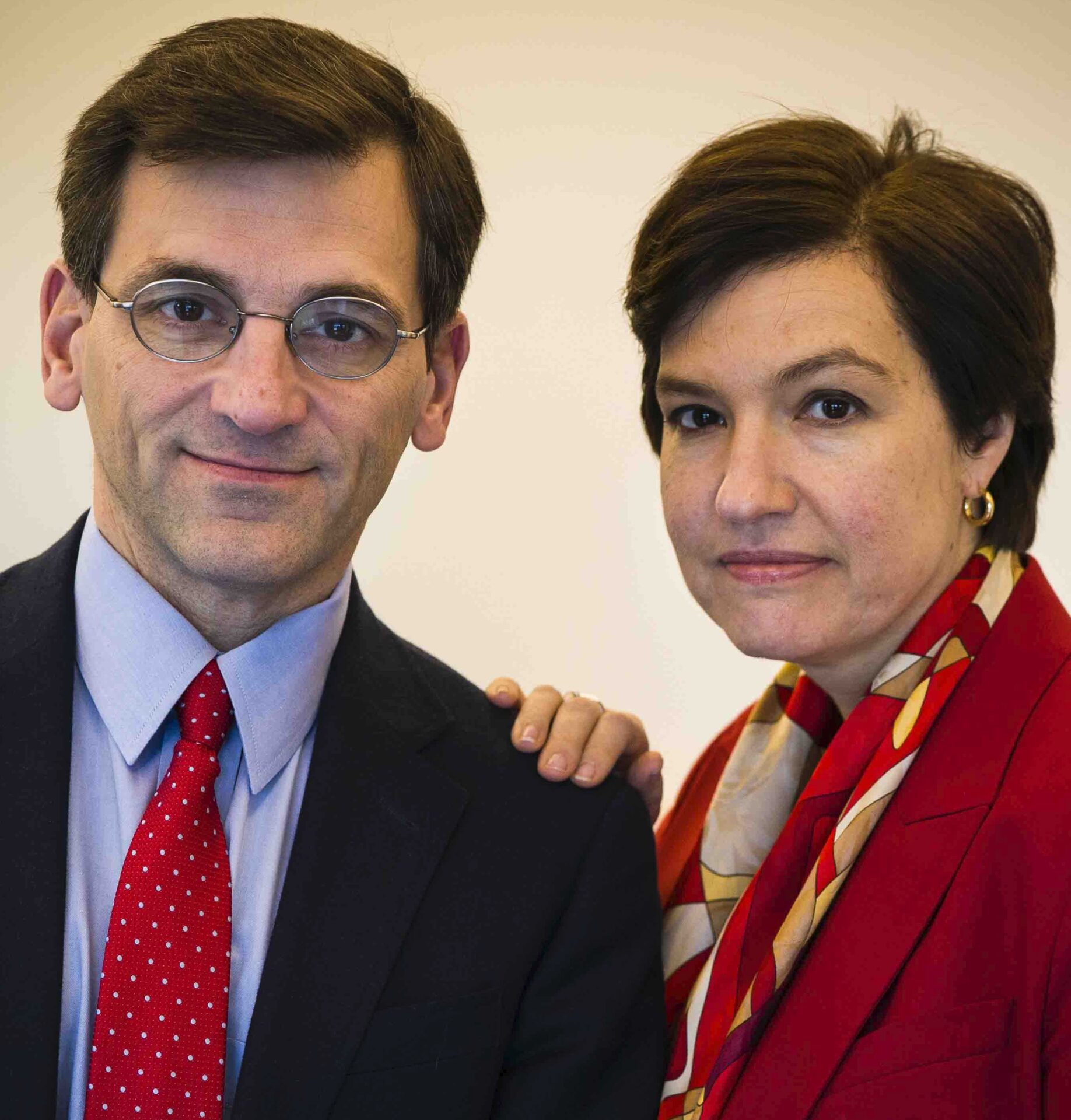
Peter Baker and Susan Glasser are the James Atlas Plenary speakers at the 2025 BIO Annual Conference.
JAMES ATLAS PLENARY, Ballroom
Peter Baker and Susan Glasser in Conversation; with Susan Page
Peter Baker is the chief White House correspondent for The New York Times and a political analyst for MSNBC. He has covered the last five presidents for The Times and The Washington Post. At The Post, he also served as Moscow co-bureau chief and covered the opening months of the wars in Afghanistan and Iraq. He is author of seven books, including the bestselling The Divider: Trump in the White House, 2017-2021, and The Man Who Ran Washington: The Life and Times of James A. Baker III, both with his wife, Susan Glasser of The New Yorker. He is a frequent panelist on Washington Week on PBS.
Susan Glasser is a staff writer for The New Yorker, author of its weekly “Letter from Trump’s Washington” and co-host of its “The Political Scene” podcast. She previously served as the editor of Politico and founded the award-winning Politico Magazine. She was editor-in-chief of Foreign Policy magazine and Moscow co-bureau chief for The Washington Post. She is author of three books, including the bestselling The Divider: Trump in the White House, 2017-2021, and The Man Who Ran Washington: The Life and Times of James A. Baker III, both with her husband, Peter Baker of The New York Times.
Susan Page is the best-selling author of three biographies of formidable women—Barbara Bush (The Matriarch), Nancy Pelosi (Madam Speaker), and Barbara Walters (The Rulebreaker). She’s also the Washington bureau chief of USA Today. A native of Wichita and graduate of Northwestern and Columbia, she has won every journalism award given specifically for coverage of the White House. She has covered the past 12 presidential campaigns and interviewed the past 10 presidents (three after they had left office). She also moderated the 2020 vice presidential debate between Mike Pence and Kamala Harris. Yes, that was the one with the fly.
10:15 AM–11:15 AM
BASICS
Narrative Uses of Perspective and Voice
How do we negotiate proximity to our subjects through the narrative choices that we make? How do we modulate tone and voice in our writing to convey our own perspectives and the perspectives of our subjects? This panel will explore how biography is a space for narrative innovation and how biographers can adapt techniques from other genres.
Moderator
Lauren Arrington is the recipient of an NEH Public Scholar Award, the Robert & Ina Caro Award from BIO, and a visiting fellowship from the New York Public Library to support her group biography of women artists working for the WPA, forthcoming with St Martin’s Press. She is the author of two previous group biographies, The Poets of Rapallo (Oxford, 2021) and Revolutionary Lives (Princeton, 2016). She is chair and professor of English at the University of South Florida.
Panelists
Natalie Dykstra is the author of Clover Adams: A Gilded and Heartbreaking Life, which won a NEH Fellowship and was a finalist for the 2013 Massachusetts Book Award. For Chasing Beauty: The Life of Isabella Stewart Gardner, she received a NEH Public Scholars grant and the inaugural Robert and Ina Caro Travel Fellowship from BIO. Chasing Beauty won this year’s Marfield Prize, the national award for arts writing. She was a co-organizer of the inaugural 2023 Biography Lab and is an emerita professor of English at Hope College. She lives near Boston.
Maryemma Graham, 2021 recipient of an American Book Award for Lifetime Achievement, is author/editor of 15 books and exhibition catalogs. The Cambridge History of African American Literature, Teaching African American Literature: Theory and Practice, and the translingual Toni Morrison: Au delà du visible ordinary/Beyond the Visible and Ordinary complement her funded initiative: the History of Black Writing. Founded in 1983, this leading research center for literary recovery and archival preservation employing interactive/digital technologies has redefined the field of Black literary studies. Graham’s The House Where My Soul Lives: The Life of Margaret Walker (Oxford), is the first complete biography of the 20th writer and institution builder. Graham is University Distinguished Professor Emerita at the University of Kansas.
Prudence Peiffer is an art historian, writer, and director of content at the Museum of Modern Art. Her book The Slip: The New York City Street That Changed American Art Forever (2023) won the New York City Book Award, was shortlisted for the Plutarch Award for best biography, was a New York Times Notable Book of the Year, and was longlisted for the National Book Award, among other accolades.
CRAFT
All Things Audio
The primacy of the written word is eroding. Our audience is increasingly turning to podcasts and recorded lectures and audio versions of biographies, and listening to our work as they drive, ride the subway, walk the dog, or exercise. Little white earbuds are replacing a fat book by the fireplace or the seashore. Do e-books and book streaming services expand our reach, or dilute our royalties? Are podcasts a unique opportunity for writers to boost their books and expand their reach—or a danger, as witty podcasters take our work, build their programs and expand their own audiences, not ours? Three accomplished podcasters offer their viewpoints and answer your questions.
Moderator
John A. “Jack” Farrell is the author of Richard Nixon: The Life, which won the PEN America award for the best biography and the New-York Historical Society book prize for the best volume of American history of 2017. It was also a finalist for the Pulitzer Prize. His 2022 book, Ted Kennedy: A Life, made the top 10 list of finalists for the National Book Award. Farrell is a University of Virginia graduate and has a Ph.D. in history from the University of Groningen in the Netherlands. In 2001 he published Tip O’Neill and the Democratic Century, which won the Hardeman prize for the best book on Congress. His book Clarence Darrow: Attorney for the Damned won the Los Angeles Times book award for best biography of 2012.
Panelists
James Ambuske is co-head of R2 Studios, the podcast division of the Roy Rosenzweig Center for History and New Media at George Mason University. He is the creator, writer, and narrator of “Worlds Turned Upside Down,” an in-depth, expertly produced podcast about the history of the American Revolution. He previously hosted the podcast, “Conversations at the George Washington Library” at Mount Vernon and frequently appears as a speaker and guest as the nation celebrates the 250th anniversary of the Revolution. He is a graduate of Miami University and has a Ph.D. in history from the University of Virginia.
Lindsay Chervinsky is a presidential historian and executive director of the George Washington Presidential Library at Mount Vernon. Her latest book, Making the Presidency: John Adams and the Precedents That Forged the Republic, was published in September 2024 by Oxford University Press. Chervinsky also authored the award-winning book The Cabinet: George Washington and the Creation of an American Institution and co-edited Mourning the Presidents: Loss and Legacy in American Culture. She has written for media outlets including The Washington Post, Time, CNN.com, and The Wall Street Journal, and starred in many podcasts, appearing often on “Listening to America” with Clay Jenkinson.
Major Garrett is the chief Washington correspondent for CBS News. As a White House correspondent, he has covered the presidential administrations of Bill Clinton, George W. Bush, Barack Obama, and Donald Trump. As the author of five books on American politics, and as a former congressional and White House correspondent for National Journal magazine, he knows his way around a keyboard as well. A California native, he is a graduate of the University of Missouri journalism school. He conceived and began hosting his trailblazing podcast, “The Takeout,” about politics, policy, and pop culture in 2017, before podcasting was cool. He was also the host of “Agent of Betrayal: The Double Life of Robert Hanssen,” a multipart podcast investigation into the most damaging spy in FBI history.
ISSUES
The Next Phase of AI and Biography
Artificial Intelligence (AI) is revolutionizing how biographies are researched, written, and safeguarded, offering unprecedented opportunities and daunting challenges. Generative AI is transforming storytelling while raising profound ethical questions about authenticity, originality, accuracy, and the role of the human voice. This panel assembles an exceptional group of experts to tackle these pressing issues. An English professor will explore biographers’ ethical dilemmas in an AI-driven landscape. A copyright and intellectual property lawyer will break down the latest legal developments, highlighting strategies (if any) to protect creative work in this evolving environment. Finally, an AI expert from Georgetown University will unveil where this rapidly advancing technology is headed, the larger implications of its usage, and how it might redefine the literary world. Join this dynamic conversation to understand better how AI is reshaping the future of biography.
Moderator
Jared Stearns is a San Francisco-based writer. His work has appeared in The Boston Globe, San Francisco Chronicle, Cineaste, The Dark Side, and The San Franciscan, among others. His first book, Pure: The Sexual Revolutions of Marilyn Chambers, was published by Headpress in 2024. He is a graduate of Emerson College in Boston.
Panelists
Ann Chaitovitz spent over 30 years in domestic and international copyright law, most recently at the USPTO’s Office of Policy and International Affairs. She was the first U.S. IP attaché in Lima, Peru, covering Bolivia, Chile, Colombia, Ecuador, and Peru. Ann served as executive director of the Future of Music Coalition, addressing issues at the intersection of music, law, technology, and policy. She was also national director of sound recordings at AFTRA and previously worked as a staff attorney at ASCAP, supporting songwriters and publishers. Her career focused on advancing intellectual property rights and creative industry advocacy.
Joseph M. Moxley is the founder of Writing Commons and a professor of English at the University of South Florida. He has written, coauthored, or edited numerous works, including a novel, 14 nonfiction books, and 37 articles in peer-reviewed journals. Moxley has self-published numerous articles at Writing Commons, an open education resource (OER) designed to support writing teachers, students, professional writers, and the broader public. The project, which provides free and accessible content on writing, has been accessed by more than 15 million users worldwide.
THEME
First Ladies: Public and Private Power
To quote Pat Nixon, “Being First Lady is the hardest unpaid job in the world.” It is a unique occupation with no set rules or protocols. First Ladies and their “soft power” are a constant source of speculation, first in the media of their era and later within historical accounts. Edith Wilson presents an intriguing example of First Lady power, accused of being “Madam President” behind the scenes when her husband Woodrow was felled by a stroke. Other First Ladies like Pat Nixon, Barbara Bush, and more recently Jill Biden were their husband’s closest confidantes and counselors as well as their steadfast campaigners. Many First Ladies like Laura Bush have chosen to focus their power on memorable “signature” initiatives, such as literacy or women’s issues. This panel will examine the power of First Ladies, both through private political influence and public initiatives.
Moderator
Peter Slevin is a contributing writer for The New Yorker, based in Chicago. He has spent much of his career writing for newspapers, spending seven years in Europe for The Miami Herald and a decade on the national staff of The Washington Post, where he wrote about foreign policy and later traveled the country with an eye to politics and stories between the coasts. His portrait of Michelle Obama—Michelle Obama: A Life—was a finalist for the PEN America biography prize and rated as one of Booklist’s top 10 biographies of the year. He teaches at Northwestern University’s Medill School of Journalism.
Panelists
Heath Hardage Lee is an award-winning historian, biographer, and curator. Lee’s narrative nonfiction book The League of Wives: The Untold Story of the Women Who Took on the U.S. Government to Bring Their Husbands Home From Vietnam (St. Martin’s Press, 2019) is currently being developed as a television series. Her new book, The Mysterious Mrs. Nixon: Washington’s Most Private First Lady, is the first commercial biography of First Lady Pat Nixon in almost 40 years. She currently serves on the boards of the First Ladies Association for Research and Education and Biographers International Organization.
Susan Page is the best-selling author of three biographies of formidable women—Barbara Bush (The Matriarch), Nancy Pelosi (Madam Speaker), and Barbara Walters (The Rulebreaker). She’s also the Washington bureau chief of USA Today. A native of Wichita and graduate of Northwestern and Columbia, she has won every journalism award given specifically for coverage of the White House. She has covered the past 12 presidential campaigns and interviewed the past 10 presidents (three after they had left office). She also moderated the 2020 vice presidential debate between Mike Pence and Kamala Harris. Yes, that was the one with the fly.
Rebecca Boggs Roberts is an award-winning educator, author, and speaker, Her most recent book is Untold Power: The Fascinating Rise and Complex Legacy of First Lady Edith Wilson. Other books include the award-winning The Suffragist Playbook: Your Guide to Changing the World; Suffragists in Washington, D.C.: The 1913 Parade and the Fight for the Vote; and Historic Congressional Cemetery. She is currently deputy director of events at the Library of Congress and has previously worked as a journalist, producer, tour guide, forensic anthropologist, event planner, political consultant, jazz singer, and radio talk show host.
11:30 AM–12:30 PM
BASICS
Ask an Agent
One of the biggest mysteries for biographers is the process of finding a literary agent. Do you need an agent to get a book deal with a publisher? What should you expect from the author/agent relationship? You’ll have a chance to pose those questions and more to Gail Ross, founder of the Gail Ross Literary Agency, and more recently founder of the WME (William Morris Endeavor) Washington, D.C., office. Four of the books Ross represented have won the Pulitzer Prize: Ada
Ferrer’s Cuba: An American History, Kai Bird and Martin Sherwin’s American Prometheus, Joby Warrick’s Black Flags, and Tina Rosenberg’s The Haunted Land. Her clients include thought leaders, CEOs, social justice activists, journalists, historians, and experts in a variety of fields. She and her team have earned a reputation in the industry for providing rigorous, enthusiastic editorial guidance at all stages of the publishing process.
Interviewer
A’Lelia Bundles is the author of Joy Goddess: A’Lelia Walker and the Harlem Renaissance, the first major biography of her great-grandmother, and of On Her Own Ground: The Life and Times of Madam C.J. Walker, a New York Times Notable Book about her entrepreneurial great-great-grandmother. She is the founder of the Madam Walker Family Archives, serves on several nonprofit boards, including Columbia Global Reports and the Schlesinger Library on the History of Women in America at Harvard Radcliffe Institute, and is a former ABC News executive, and Emmy Award-winning NBC News producer.
Guest
Gail Ross represents important commercial nonfiction across all genres. She co-founded the Washington D.C., office of WME in 2023. Prior to joining WME, she operated the Gail Ross Literary Agency, which became the Ross Yoon Agency in 2010. Washingtonian magazine has named her one of the most powerful women in Washington for several years running. Ross is also the author of The Writer’s Lawyer and The Essential Guide to Entertainment Law’s chapter on book publishing contracts. She speaks widely about publishing and book contracts across the country. Her daily mantra is: Books Change Lives.
CRAFT
Graphic Biography: What’s Gained, What’s Lost?
Somewhere between the prose biography and the cinematic biopic stands the phenomenon of the graphic biography. What does “sequential art,” as pioneering graphic novelist Will Eisner called the medium, offer a reader that other media don’t? What subjects are best served by the graphic treatment, and what subjects suffer from that combination of words and pictures? And what is the subliminal effect of filling in the visual blanks when we don’t know what a given setting looked or felt like? A panel of graphic biographers discusses what makes graphic memoir unique and uniquely challenging.
Moderator
Danny Fingeroth is a biographer and cultural historian. His 2023 book, Jack Ruby: The Many Faces of Oswald’s Assassin (Chicago Review Press), examines this bizarre figure who changed history with his 1963 murder of the accused JFK assassin on live TV. Fingeroth’s 2019 biography A Marvelous Life: The Amazing Story of Stan Lee (St. Martin’s Press/Macmillan), looks closely at the controversial co-creator of Marvel Comics. Fingeroth has served as executive editor at Marvel and other companies, spoken and taught at venues including the Smithsonian, Columbia University, and the Bob Dylan Conference, and appeared on NBC’s Today Show and NPR’s All Things Considered.
Panelists
Sabrina Jones creates comics and graphic novels on social justice and radical history. Her books include Race to Incarcerate, and Our Lady of Birth Control: A Cartoonist’s Encounter with Margaret Sanger. She has created graphic biographies of Isadora Duncan, Jane Jacobs, Walt Whitman, FDR, Peace Pilgrim, and Jesus. She began cartooning in the political comics magazine World War 3 Illustrated, and has continued to edit and contribute to many issues, including the recent, My Body/Our Rights.
Adam Leslie is the co-founder and CEO of Real Spy Comics, which has exclusive access to never-before-told stories from real-life spies, clandestine agents, and covert operators. He is director of the Washington office of the Australian Strategic Policy Institute, with more than 30 years of experience spanning national security, defense, and diplomacy. He was a national security professional with the Australian government. where he led multidisciplined teams to address Asia-Pacific regional security issues, and was the founder of OTX International, a 501(c)(3) not-for-profit established while he and his team were exfiltrating at-risk Afghans being targeted by the Taliban.
Tim E. Ogline, a Philadelphia-based writer, illustrator, and design professional, teaches at Moore College of Art & Design and has taught previously at the Tyler School of Art, as well. He co-wrote and illustrated the acclaimed graphic nonfiction title We Survived the Holocaust as well as writing and illustrating the recently published The Way to Wealth: Benjamin Franklin on Matters of Money and Lessons on Livelihood. His award-winning design practice serves prominent clients, while his illustrations have appeared in major publications including The Wall Street Journal, Institutional Investor, The Philadelphia Inquirer, and the Utne Reader, among others.
Mimi Pond is from San Diego and attended the California College of Arts and Crafts. In the 1980s, as a cartoonist and illustrator, she produced five humor books, including The Valley Girls’ Guide to Life. Now living in L.A., she continues to create comics for magazines and websites. Her 2014 graphic novel, Over Easy, a fictionalized account of her ’70s waitressing career, published by Drawn & Quarterly, was on the New York Times bestseller list, and won a PEN Award. She followed it up with 2017’s acclaimed The Customer Is Always Wrong. Her graphic biography of Britain’s storied Mitford sisters, Do Admit: The Mitford Sisters and Me, will be published in fall 2025 by D&Q.
ISSUES
For the Win: Biographers Tackle the Lives, Legacies, and Impact of Athletes in and out of Sports
This panel addresses sports and the people who play them. We are told it’s not whether you win or lose, it’s how you play the game. But how do biographers comprehensively research and engagingly write about the exploits, growth, and impact of their subjects within competitive games and in the game of life? How does writing about people in sports compare with writing about people in other fields? What can biographers of athletes learn from biographers of others, and vice versa? This panel explores the craft and process of composing biographies of sports figures, revealing the ways that athletes and their biographers grapple with myriad complexities, including misconceptions about sports and their players, social and cultural history, and challenges and contributions within and beyond the playing arena and the business of sports.
Moderator
Susan Ware is the author of numerous biographies of twentieth-century American women, including Amelia Earhart, Molly Dewson, Mary Margaret McBride, and Billie Jean King, as well as two collective biographies. She was the general editor of Notable American Women: Completing the Twentieth Century from 1997-2004 and of American National Biography from 2012-2022. She has served on the selection committees for the Bancroft Prize, the Francis Parkman Prize, and BIO’s Plutarch Award and was a co-founder of the New England Biography Seminar at the Massachusetts Historical Society.
Panelists
Madeleine Blais won a Pulitzer Prize for her journalism at Tropic Magazine of the Miami Herald. She is a professor emerita in the Journalism Department at the University of Massachusetts and the author of The Heart Is an Instrument (a collection of essays), In These Girls Hope Is a Muscle (finalist for the National Book Critics Circle award in nonfiction), Uphill Walkers: Memoir of a Family, To the New Owners: A Martha’s Vineyard Memoir, and Queen of the Court: The Many Lives of Tennis Legend Alice Marble. Her current project is set in Miami in the 1980s.
Ashley Brown is the author of Serving Herself: The Life and Times of Althea Gibson. Serving Herself has received the Shapiro Book Prize from the Huntington Library’s Shapiro Center for American History and Culture, the Association of Black Women Historians’ Letitia Woods Brown Book Prize, the Popular Culture Association’s Harry Shaw and Katrina Hazzard-Donald Award, and the United States Golf Association’s Herbert Warren Wind Book Award. Brown is an associate professor and the Allan H. Selig Chair in the History of Sport and Society at the University of Wisconsin-Madison, where, among many other courses, she teaches Biography in U.S. Sports History.
Samuel G. Freedman is an award-winning author, professor, and journalist. He has written 10 acclaimed books, winning the Hillman Prize for Book Journalism for his most recent, Into the Bright Sunshine: Young Hubert Humphrey and the Fight for Civil Rights. His previous books have been finalists for the National Book Award and the Pulitzer Prize and have received the New York Public Library Helen M. Bernstein Award for Excellence in Journalism and the National Jewish Book Award. As a professor at Columbia Journalism School, Freedman has been named the nation’s Outstanding Journalism Educator by Sigma Delta Chi. His course in book-writing has produced more than 110 authors, editors, and agents.
Andrew Maraniss is a New York Times bestselling author of sports and social justice nonfiction for adults, teens, and children. His books have received the RFK Book Award, Lillian Smith Book Award, and Sydney Taylor Honor Award; been named to the ALA’s Rainbow Book List and RISE Feminist Book List; and named to Esquire’s 100 Best Baseball Books Ever Written. Maraniss is director of special projects at the Vanderbilt University athletic department, where he manages the university’s Sports & Society Initiative. He lives in Nashville with his wife and two children.
THEME
Biographers’ Use of Government Archives
Federal Bureau of Information files, State Department, Army, Navy, Air Force, Central Intelligence Agency, and other government documents, as well as documents held by the United States government in collections, can provide unexpected revelations to biographers and memoirists. Yet the import of these discoveries is not limited to Americans. While reports on U.S. citizens provide fruitful information on Americans, the archives also contain astounding amounts of information on foreign people and institutions. Washington, D.C., is the ideal setting for an exploration of the United States government’s holdings that have global reach. The panelists will unpack strategies for how to use government documents in narratives as well as how to work in non-U.S. archives.
Moderator
Steve Paul spent more than 40 years in daily journalism and is now, as an independent scholar, devoted to literary biography. He is a former board member of the National Book Critics Circle, an active member of the Ernest Hemingway Society, and currently president of Biographers International Organization. He co-edited a collection of scholarly essays on Ernest Hemingway’s early life and writings and is the author of Hemingway at Eighteen and Literary Alchemist: The Writing Life of Evan S. Connell. He is currently at work on a biography of the poet William Stafford.
Panelists
Kirstin Downey began her career in journalism and in 1988 began writing for The Washington Post, where she continued working until she began studying economic history at Harvard University. Downey won awards for her coverage of the aftermath of the savings-and-loan debacle, and she was among Washington Post staff members who received a Pulitzer Prize. Her biography of Frances Perkins, The Woman Behind the New Deal, was named one of the best nonfiction books of 2009 by the Library of Congress, the ALA, and NPR. Her next book, Isabella, received a starred review from Kirkus Reviews.
Ashley Farmer is a historian of Black women’s history, intellectual history, and radical politics. Her book Remaking Black Power: How Black Women Transformed an Era is the first comprehensive study of Black women’s intellectual production and activism in the Black Power era. Her next book, Queen Mother Audley Moore: Mother of Black Nationalism, will be the first biography of one of the most influential yet understudied activists and thinkers of the 20th century, Audley Moore. Moore’s life and activism from 1898 to 1997 reveals how she was an important but overlooked progenitor of Black Nationalist thought and activism.
Victoria Phillips is the author of Martha Graham’s Cold War, which took her to archives internationally. It will be republished in Russian in 2027. She is a global fellow at the Wilson Center, a lecturer at the CUNY program in Biography and Memoir, and a fellow at the Oxford University Centre for Life Writing to complete a biography of Eleanor Lansing Dulles. Since 2013, she has co-directed the Cold War Archival Research Institute, which trains young scholars in cooperative methods of global research, and is the co-founder of the Global Biography Working Group.
Nicholas Reynolds, after receiving a Ph.D. from Oxford in 1970, joined the Marine Corps, serving as an infantry officer and then as an officer in charge of field history, deploying historians globally. He then worked at CIA, most recently as the historian for the CIA Museum, where he drafted the strategic plan for the next decade and wrote a foundational monograph. He still believes he has held the best two niche jobs in the U.S. government. Leveraging his experience, he has taught at the Naval War College, Johns Hopkins University, and the Osher Lifelong Learning Institute.
12:30 PM–2:30 PM
Lunch and Awards Presentation, Ballroom
BIO Award and Keynote Address by the recipient, followed by presentation of the Biblio Award and the Plutarch Award
2:45–3:45 PM
BASICS
The Unreliable Narrative Source: Coping With Essential but Untrustworthy Sources
If only everyone always told the verifiable truth! When biographers delve into another person’s life, we may assume that the basic record will hold up, with some fudging or misremembrance here and there. But what happens if we discover that our subject is sometimes (or often) a liar? That some primary or secondary sources, not to mention accepted lore, have gotten it wrong? How much do we trust interviewees, whose tales may have no written record or other witnesses? In weaving graceful, intelligible, engaging narratives, how do we balance what our research uncovers that contradicts our subjects’ stories, and what we suspect motivated their deceptions? This panel of biographers and oral historians will tackle the tall tales and tangled trails of truth-telling, an increasingly important subject in an age of pervasive and pernicious deepfakes and “alternative facts.”
Moderator
Eve M. Kahn is writing the forthcoming biography (due this fall from Fordham University Press) of the reformer and journalist Zoe Anderson Norris (1860-1914), who published reams of lies mixed with raw confessional soul-baring. In some writings, for instance, Norris claimed to have grown up in Kentucky plantation splendor, but other works reveal her childhood’s grinding poverty that fostered her sympathy for New York’s poorest immigrants. The 19th-century painter Mary Rogers Williams, subject of Kahn’s 2019 book (Wesleyan University Press), mostly told the truth while trying to ensure that many truths (including her sexual orientation) stayed secret.
Panelists
Marnie Mueller, award-winning novelist, is accustomed to fabricating lives/lies in her fiction, but met her match in writing The Showgirl and the Writer: A Friendship Forged in the Aftermath of the Japanese American Incarceration (Peace Corps Writers, 2023). This hybrid memoir/biography explores the convergences between Mary Mon Toy, a Nisei performer, and Mueller’s own life history as a Caucasian born in the Tule Lake Japanese American High Security Segregation Camp. Mon Toy challenged Mueller’s nonfiction skills, in recreating herself as a Chinese American performer in order to wipe out her ethnicity and incarceration as Japanese American in post WWII America.
Alison Owings, journalist/oral historian, is the author of Mayor of the Tenderloin: Del Seymour’s Journey From Living on the Streets to Fighting Homelessness in San Francisco (Beacon), called “a memorable biography… both entertaining and life-affirming” (Booklist) and “a richly satisfying tapestry” (San Francisco Chronicle). Her previous books include Frauen: German Women Recall the Third Reich (Rutgers), a New York Times Notable Book; Hey, Waitress! The USA From the Other Side of the Tray (California); and Indian Voices: Listening to Native Americans (Rutgers). Different subjects, same questions: Have falsehoods swept into the interviews? What to do with whoppers (“Hitler did not know what went on in the camps”) or deflection (“my memory fails”)? Is the chaff as compelling as the wheat?
Eric K. Washington is a historian, author, and BIO board member. His 2019 biography, Boss of the Grips: The Life of James H. Williams and the Red Caps of Grand Central Terminal (Liveright), was lauded as “an illuminating chronicle” (Edward Kosner, Wall Street Journal) that invoked “a fitting exemplar of Harlem’s ambitious Black middle class” (Publishers Weekly). It won Columbia University’s Herbert H. Lehman Prize for Distinguished Scholarship of New York History, the Guides Association of New York City’s GANYC Apple Award, and recognition from the Municipal Art Society of New York’s Brendan Gill Prize committee. He chairs BIO’s Frances “Frank” Rollin Fellowship, for biographies-in-progress of African American figures.
CRAFT
Co-Authored Biography
The questions related to the co-authored biography are seemingly endless. What are the pitfalls and/or advantages of such ventures? How can such projects be pitched to both agents and publishers? How does the research process come together? How do authors who participate in such projects reconcile their respective styles and outlooks and establish ground rules for editing each other’s work? And are such collaborative projects generally superior to the sum of their parts (and the knowledge of the respective partners)? Join us for an engaging exchange on the possibility of two biographers coming together to conjure up one life.
Moderator
Emily Setina teaches 20th- and 21st-century American literature at the University of Nevada, Las Vegas. She is co-editor of the forthcoming Oxford Handbook of Gertrude Stein and author of The Writer in the Darkroom: Photography and Biography in Virginia Woolf, Gertrude Stein, and Marianne Moore, also forthcoming from Oxford University Press. With Susannah Hollister, she is currently at work on a co-authored biography of New York School poet and teaching pioneer Kenneth Koch. Their previous collaboration was a critical edition of Stein’s long poem “Stanzas in Meditation.”
Panelists
Kai Bird is a Pulitzer Prize-winning historian who has published biographies of John J. McCloy, McGeorge Bundy, J. Robert Oppenheimer, Robert Ames—and most recently The Outlier: The Unfinished Presidency of Jimmy Carter. He has also authored a memoir about his childhood in the Middle East. He is the director of the Leon Levy Center for Biography at the Graduate Center of the City University of New York. His next book is a biography of Roy Cohn. His biography of Oppenheimer, American Prometheus, co-authored with the late Martin J. Sherwin, was the inspiration for Christopher Nolan’s film, Oppenheimer.
Andrew S. Curran is the author of the forthcoming The Race Makers – a group biography moving from Louis XIV to Thomas Jefferson. Previous books include Who Is Black and Why?, co-authored with Henry Louis Gates, Jr., The Anatomy of Blackness, and Diderot and the Art of Thinking Freely, named a best book of the year by Kirkus Reviews and other outlets. He has also written for The New York Review of Books, The New York Times, The Guardian, Time, and The Paris Review. Curran is a fellow at the New York Academy of Medicine and the William Armstrong Professor of the Humanities at Wesleyan. His next project, entitled Good Beyond Belief, is a group biography on the history of atheism written in collaboration with Dennis C. Rasmussen.
Allison Gilbert is an Emmy Award-winning journalist and a contributor to The New York Times. She is the author and co-author of numerous books, including Listen, World!, the first biography of Hearst newspaper columnist Elsie Robinson, winner of the 2023 Northern California Book Award. Gilbert’s essay for CNN about the reporting obstacles she overcame uncovering Robinson’s life story won the 2024 New York Press Club’s Journalism Award for Best Opinion Writing. She is co-author with Dr. Ruth Westheimer of The Joy of Connections: 100 Ways to Beat Loneliness and Live a Happier and More Meaningful Life, released two months after the American icon passed away.
ISSUES
Skeletons in the Closet
This panel addresses the ethical and narrative dilemmas that arise when a biographer learns that a subject has engaged in reprehensible or suspect behavior. The person’s misdeeds may be part of the public record or come to light only through the biographer’s research and interviews. In either case, a writer must figure out how best to handle the findings. Is it ever acceptable to omit damaging material? What if our subject is still alive? Beyond reporting facts, is it our place to pass moral judgment? How do we navigate between past and present standards of morality or provide context for understanding our subject’s actions without becoming an apologist for them? Scandals also present narrative challenges in that they can overshadow our subject’s accomplishments. Does scandal still sell or are publishers justifiably wary of books about people who have disgraced themselves? Wither the “warts and all” biography in the 21st century?
Moderator
Vincent DiGirolamo is associate professor of history at Baruch College and author of Crying the News: A History of America’s Newsboys (Oxford University Press, 2018), winner of the Turner, Taft, Mott, Palmegiano, and DeSantis prizes in history. His work has appeared in Time magazine, the London Times, and The San Francisco Examiner-Chronicle. His latest essay, “Slaves in the Salon: The Underside of Julius LeBlanc Stewart’s Belle Epoque,” examines the American-born artist’s centuries-long family involvement in Cuban sugar slavery. It was published in The Sweet Life: Julius LeBlanc Stewart and Painting the Belle Epoque (Giles, 2024). DiGirolamo is currently writing a biography of Gilded Age radical journalist John Swinton.
Panelists
Barbara Burkhardt is professor emerita of English at the University of Illinois Springfield and author of William Maxwell: A Literary Life (University of Illinois Press, 2005), which plumbs Maxwell’s highly autobiographical fiction and his long career as fiction editor at The New Yorker. Burkhardt is also the editor of Conversations With William Maxwell (University Press of Mississippi, 2012, 2024). She is currently working on a biography of American author, singer, humorist, and radio personality Garrison Keillor.
Kitty Kelley is the author of seven No. 1 New York Times bestselling biographies: Oprah: A Biography (2010), The Family: The Real Story of the Bush Dynasty (2004), The Royals (1997), Nancy Reagan: The Unauthorized Biography (1991), His Way: The Unauthorized Biography of Frank Sinatra (1986), Elizabeth Taylor: The Last Star (1981), and Jackie Oh! (1978). She also wrote two books about Stanley Tretick’s photographs and a children’s book, Martin’s Dream Day (2017). Kelley has received many honors from her peers, including the 2005 PEN Oakland/Gary Webb Anti-Censorship Award, the 2014 Founders’ Award from the American Society of Journalists and Authors, and, most recently, the 2023 BIO Award.
Roger K. Newman is professor emeritus of the Columbia University Graduate School of Journalism and the author of Hugo Black: A Biography (Pantheon, 1994), a finalist for the 1995 Pulitzer Prize. The most liberal and influential U.S. Supreme Court justice of the 20th century, Black’s legal career was nearly derailed shortly after his appointment by Franklin Roosevelt in 1937 by exposés of his membership in the Ku Klux Klan as a young lawyer in Alabama. Newman has also taught constitutional Law at New York University and is editor of The Yale Biographical Dictionary of American Law (Yale University Press, 2009). He is now working on a book on the Supreme Court and the conservative movement.
THEME
Black Music Biography
Black music has defined American culture, but only in recent publishing trends have the lives of the artists themselves been the subject of major biographies worthy of their cultural impact. How have biographers used archives, particularly recorded sound and oral history, to document their subjects’ lives in print? What techniques do they use to find and interview sources? How do they combine music history with social and political history? What are the challenges of the genre? Why is it important to tell the life stories of Black music icons and the marginalized communities that nurtured their artistic genius? Recent and forthcoming biographies of hip-hop progenitors, children’s music pioneers, and the unsung women of jazz and blues weigh in on the artistry, activism, and influence of their subjects, and how they changed the sound of American music forever.
Moderator
Aidan Levy is the author of Saxophone Colossus: The Life and Music of Sonny Rollins (Hachette Books, 2022), which won an American Book Award from the Before Columbus Foundation and the Jazz Journalists Association Jazz Award for Biography/Autobiography of the Year and was longlisted for the PEN/Jacqueline Bograd Weld Award for Biography. He began work on the book as a Leon Levy Center for Biography fellow. He is the author of Dirty Blvd.: The Life and Music of Lou Reed and editor of Patti Smith on Patti Smith: Interviews and Encounters.
Panelists
Danielle Amir Jackson is a writer and critic born in Memphis. Her essays on music, film, and books appear in The New York Times, The Atlantic, The American Scholar, and other publications. From 2020-2024, she was editor-in-chief of the Oxford American. She is currently at work on her first book, Honey’s Grill, a cultural history of women-helmed spaces and the evolution of the blues.
Marcus J. Moore is the critically acclaimed author of The Butterfly Effect: How Kendrick Lamar Ignited the Soul of Black America (Atria, 2020) and High and Rising: A Book About De La Soul (Dey Street, 2024). Moore writes about jazz and other experimental music for various outlets and has curated concerts and interview programming in Washington, D.C., and New York City.
Giovanni Russonello is a writer, editor, educator, and organizer working at the intersection of music, politics, and U.S. history. His work critically interrogates establishment wisdom and suppressed histories, especially around the guiding role that jazz and Black music have played in American society. Russonello is the only person to have served as both a politics columnist and a music critic for The New York Times. A 2024 DC Commission on the Arts & Humanities fellow and an adjunct professor at NYU, he also edits capitalbop.com, a web magazine covering the Washington, D.C., jazz scene, and is working on a book about Gil Scott-Heron and D.C. in the 1970s and ’80s (due out in 2026 from Metropolitan Books/Macmillan and Faber & Faber).
Gayle Wald is professor of American studies at George Washington University. She has written two biographies: This is Rhythm: Ella Jenkins, Children’s Music, and the Long Civil Rights Movement (University of Chicago Press, 2025) and Shout, Sister, Shout! The Untold Story of Rock-and-Roll Trailblazer Sister Rosetta Tharpe (Beacon Press, 2007, 2023). The Tharpe book inspired a documentary (Godmother of Rock) as well as a musical (Shout, Sister, Shout!), produced most recently at Ford’s Theatre in Washington, D.C. It is often cited as a spur to Tharpe’s 2018 induction into the Rock & Roll Hall of Fame.
4:00–5:00 PM
BASICS
Chasing Ghosts: First-Time Biographers Confronting Elusive Subjects
What happens when a first-time biographer chooses to write about an elusive figure, especially one with a carefully guarded private life? Anxiety. Wrestling to unearth hidden or buried primary source material. Panic and depression. And then, sometimes, bursts of revelation and grace that lead to cracking the story, seeing the project to completion, and finally, publication. A discussion with biographers who chose to tackle particularly difficult subjects for their first books: Edward Hopper, Connie Converse, Gertrude Hoffman, Robert Johnson, and Buckminster Fuller. Topics to be discussed may include earning the trust of interviewees, methodology for tracking down primary source material, dealing with recalcitrant estates, interfacing with editors and publishers, making judgments about what deserves to be in the public record even when certain information is unflattering or harmful to the subject’s reputation, and carrying forward the legacy of complicated individuals.
Moderator
Sunny Stalter-Pace is the Hargis Professor of American Studies at Auburn University. She wrote Imitation Artist: Gertrude Hoffmann’s Life in Vaudeville and Dance, published with Northwestern University Press in 2020. Her current research project is a cultural history of the New York Hippodrome. She has received fellowships from the New York Public Library, the Harry Ransom Center for the Humanities, and Wake Forest University. She has published extensively on popular performance and New York City.
Panelists
Gail Levin is Distinguished Professor of art history, American studies, and women’s studies at Baruch College and the Graduate Center of the City University of New York. An acknowledged authority on American painter Edward Hopper, she has curated landmark exhibitions, written many books, including Hopper’s catalogue raisonné; definitive first biographies of Hopper, Lee Krasner, and Judy Chicago; studies on Aaron Copland, Synchromism, and abstract expressionism; essays on theory of biographies of artists and ethics in the visual arts; and articles on modern and contemporary art ranging from the Stieglitz circle to American, Asian, and Jewish feminist artists.
Alec Nevala-Lee is the author of Inventor of the Future: The Visionary Life of Buckminster Fuller, which was included on Esquire‘s list of the 50 best biographies of all time, and the Hugo Award finalist Astounding: John W. Campbell, Isaac Asimov, Robert A. Heinlein, L. Ron Hubbard, and the Golden Age of Science Fiction. His biography of the physicist Luis W. Alvarez, Collisions, will be published by W. W. Norton this month. He was a juror for the 2024 Pulitzer Prize for Biography and recently participated in The New York Times’ survey of the best books of the 21st century.
John Troutman is curator of music and musical instruments at the Smithsonian’s National Museum of American History. His books include Kīkā Kila: How the Hawaiian Steel Guitar Changed the Sound of Modern Music and Indian Blues: American Indians and the Politics of Music, 1879-1934. His edited edition of Robert “Mack” McCormick’s Biography of a Phantom: A Robert Johnson Blues Odyssey, received an end-of-year New York Times Critics Pick of 2023, made Kirkus Reviews’ list for Best Biographies of 2023, and was the winner of Living Blues magazine’s Critics Poll for Best Blues Book of 2023.
CRAFT
U.S. Government Archives and Archivists
Last year, the Opinion section of The New York Times told the story of a son’s recovery of his father’s personal legacy using an unlikely source: a Federal Bureau of Investigation (FBI) report that dates back 75 years. FBI reports can be treasure troves of information revealing not only political alliances, but also private dalliances, nervous breakdowns, dinner table conversations, and even assessments of a woman’s mothering abilities. In addition to FBI files, State Department, Army, Navy, Air Force, Central Intelligence Agency, and other government documents, as well as documents held by the government in collections, can provide unexpected revelations. The panel’s experts will offer strategies for obtaining and reading documents and strategies for cross reading with private archives.
Moderator
Christian F. Ostermann, an award-winning historian, is the founding director of the History and Public Policy Program at the Wilson Center, which brings historical context to international public policy issues. He oversees the Center’s Cold War International History Project, co-directs the Nuclear Proliferation International History Project and its Nuclear History Boot Camp, and the Cold War Archival Research Institute. He created the North Korea International Documentation Project, which documents North Korean politics and foreign policy. Under his leadership, the Center launched the global archival platform Digital Archive—International History Declassified, winner of the American Historical Association’s 2013 Roy Rosenzweig Prize.
Panelists
Lauren Harper is Freedom of the Press Foundation’s first Daniel Ellsberg Chair on Government Secrecy, a position established to honor and continue the legendary whistleblower’s fight for secrecy reform. Her work highlights how excessive government secrecy prevents the public from meaningfully participating in self-government in every area that secrecy permeates, from public health to foreign policy. She advocates for commonsense improvements to the classification system, reforms to the Freedom of Information Act, and increased government accountability. Harper previously served as the public policy director for the National Security Archive in Washington, D.C., helping researchers get historically significant government documents declassified.
David A. Langbart works in Research Services at the U.S. National Archives. He has over 45 years of experience appraising, processing, describing, and performing reference service on government records. He is the senior specialist on the records of the foreign affairs agencies and has significant familiarity with the records of the national level intelligence agencies, the Federal Bureau of Investigation, and the Executive Office of the President. In 2021 he received the first-ever Anna K. Nelson Prize for Archival Excellence of the Society for Historians of American Foreign Relations (SHAFR).
David Robarge received his Ph.D. in American history from Columbia University and worked for David Rockefeller before joining the CIA in 1989. Robarge moved to the CIA History Staff in 1996 and was appointed chief historian of the CIA in 2005. His biography of Director of Central Intelligence John McCone was recently declassified, along with his most recent biography of General George Marshall. His articles and book reviews on CIA leaders have appeared in renowned journals.
Marissa Vassari is the archivist and educator in the Research and Education division of the Rockefeller Archive Center (RAC). She has presented at the Mid-Atlantic Regional Archives Conference, was invited to conduct the RAC World War II Refugee Scholars Workshop at the New School for Social Research and Parsons Paris’ International Symposium in Exile: Intellectuals, Artists, and Universities, and has published an article about developing policies and procedures for temporary exhibits in archives in Collections: A Journal for Museum and Archives Professionals. In 2016, she founded the Archival Educators Roundtable, which facilitates communication among professionals who use primary sources in public outreach and teaching.
ISSUES
Ten Years and Counting: How to Live With Your Biography
Researching and writing a life often takes a very long time, and nearly always longer than the biographer expects: organizing and digitizing an archive, creating an historical/intellectual/cultural context, traveling to the places that mattered to a subject and helped make them who they were, transforming massive amounts of information into narrative. This panel will touch on practical aspects of the long haul—funding, time management, and strategies for making archival research more efficient. But the primary focus will be on the psychology of living with another person’s life for a decade or more. Managing self-doubt and deadline anxiety, keeping your personal relationships in order, finding community, even making the loneliness of the long-distance writer work to your advantage. All these will be considered in a wide-ranging discussion that welcomes audience participation. So many of us have been there!
Moderator
Carla Kaplan, Davis Distinguished Professor of American Literature at Northeastern University, has published seven books, including Miss Anne in Harlem: The White Women of the Black Renaissance, and Zora Neale Hurston: A Life in Letters, both New York Times Notable Books. Her biography of Jessica Mitford is forthcoming from HarperCollins in 2025. Kaplan chairs the Signs editorial board, founded Northeastern’s Humanities Center, has held fellowships from the NEH Public Scholars, the Guggenheim Foundation, Cullman Center, DuBois Institute, Schomburg Center, New England Regional Fellowship Consortium, and elsewhere, is on the BIO board, and is a Society of American Historians fellow.
Panelists
Nicholas Boggs is the author of Baldwin: A Love Story, forthcoming from Farrar, Straus and Giroux in August 2025. He rediscovered and co-edited Baldwin’s collaboration with French artist Yoran Cazac, Little Man, Little Man: A Story of Childhood (2018).
Megan Marshall is the author, most recently, of the essay collection After Lives: On Biography and the Mysteries of the Human Heart. Her biography Margaret Fuller: A New American Life was awarded the 2014 Pulitzer Prize in Biography. The Peabody Sisters: Three Women Who Ignited American Romanticism won the Francis Parkman Prize, the Mark Lynton History Prize, and was a finalist for the Pulitzer Prize. Elizabeth Bishop: A Miracle for Breakfast is a genre-blurring biography-cum-memoir of her poetry professor at Harvard College in the 1970s. She is the Charles Wesley Emerson College Professor at Emerson College and a recipient of the BIO Award.
Tamara Payne is a Pulitzer Prize-winning co-author of The Dead Are Arising: The Life of Malcolm X, written with her father, the Pulitzer Prize-winning journalist Les Payne, and published by Liveright.
THEME
Presidential Biographies in Contemporary Culture
Most presidential biographies are celebratory in nature. Even presidents unpopular in their time may see their lives portrayed in a far more favorable light after some years have passed. Can a president’s life ever be told as a story of success and triumph, or is the pursuit of power inherently corrupting? Thoughtful biographers grapple with these issues and search for balance. This panel will explore the challenges they face.
Moderator
Will Swift is a biographer, a historian, and a practicing clinical psychologist. His Pat and Dick: The Nixons, An Intimate Portrait of a Marriage (2014) was short-listed for the Plutarch Award and was a New York Times Editor’s Choice. His previous books are The Roosevelts and the Royals (2004) and The Kennedys Against the Gathering Storm (2008). Swift is a founding Board member, a current Board member, and a past president of BIO. He particularly enjoys discovering facts which help repair historical reputations.
Panelists
James Bradley is the author of Martin Van Buren: America’s First Politician, published by Oxford University Press. He is also the co-editor of the Martin Van Buren Papers and the editor of the forthcoming Selected Papers of Martin Van Buren. Bradley also teaches documentary editing in the public history program at the State University of New York at Albany and was the senior project editor of The Encyclopedia of New York City.
Nancy Isenberg is the T. Harry Williams Professor of History at Louisiana State University. Her 2016 book, White Trash: The 400-Year Untold History of Class in America, was a New York Times bestseller. Her books about U.S. presidents include Madison and Jefferson (2013) and The Problem of Democracy: The Presidents Adams Confront the Cult of Personality (2019), both written with Andrew Burstein.
Carl Rollyson is a prolific biographer and a professor of journalism at Baruch College. He has written biographies of William Faulkner, Marilyn Monroe, Norman Mailer, and Thurgood Marshall, among many other figures in the world of literature, politics, and the arts. His forthcoming book, Making the American Presidency: How Biographers Shape History, will be published by the University of Virginia Press.
5:00–7:00 PM
Closing Reception
Saturday, June 7
11:00 AM–12:45 PM
WORKSHOP: Digging Up the Dirt for a Great Biography, Lisagor Room, National Press Club
Note: The workshop is limited to those who signed up in advance. If you would like to participate, you must purchase the workshop admission as a ticket add-on when you register for the conference through Eventbrite.
Painting detailed settings and giving breath to characters is a must to draw in readers. They should feel as though they’re hiding from assassins in Nazi-occupied France, or pounding the halls of Congress, confronting hostile lawmakers. I’ve written those scenarios and more, tapping into resources some writers never consider.
Much treasure can be found by researching our subjects in different ways, by learning the weather, movies, and fashion trends of the time we’re writing about. Thinking outside the box will make any book shine!
As a self-confessed research junkie (the archives of France and England were a hoot!), I’ll show my fellow biographers:
- How to build their characters by researching others who orbit them.
- How to knit researched details into narrative without the dreaded, “as you know, Bob.”
- When to STOP researching to prevent “information dump” on readers.
You’ll leave with more than one “ah ha” tidbit – guaranteed!
Judith Pearson is a bestselling author, an accomplished presenter, and a graduate of Michigan State University. But her favorite title is “story teller,” with a little “research junkie” thrown in. Those characteristics have resulted in six biographies, including a bestseller and award-winners. An accomplished presenter, Pearson has turned her books’ subjects into presentations viewed by thousands in the U.S. and the U.K. She was named one of Chicago’s Most Inspirational Women by Chicago Magazine, selected as a finalist for the Arizona Healthcare Leadership Awards, and named a Phoenix Healthcare Hero. Pearson and her husband live in Nokomis, Florida.
Coaching Sessions
Face-to-face coaching sessions are available to conference participants who seek advice from an experienced biographer. Each session lasts 45 minutes and costs $50, paid directly to the coach. To request a coaching session, email a one-page description of your project along with a specific question or two to president@biographersinternational.org.
Photos
- David Starry Photography
- David Starry Photography
- David Starry Photography
- David Starry Photography
- David Starry Photography
- David Starry Photography
- David Starry Photography
- David Starry Photography
- David Starry Photography
- David Starry Photography
- David Starry Photography
- David Starry Photography
- David Starry Photography
- David Starry Photography
- David Starry Photography
- David Starry Photography
- David Starry Photography
- David Starry Photography
- David Starry Photography
- David Starry Photography
- David Starry Photography
- David Starry Photography
- David Starry Photography
- David Starry Photography
- David Starry Photography
- David Starry Photography
- David Starry Photography
- David Starry Photography
- David Starry Photography
- David Starry Photography
- David Starry Photography
- David Starry Photography
- David Starry Photography
- David Starry Photography
- Diana Parsell
- Diana Parsell
- Diana Parsell
- Diana Parsell
- Diana Parsell
- Diana Parsell
- Diana Parsell
- Diana Parsell
- Diana Parsell
- Diana Parsell
- Diana Parsell
- Diana Parsell
- Diana Parsell
- Steve Paul
- Steve Paul
- Steve Paul
- Steve Paul
- Steve Paul
- Steve Paul
- Steve Paul
- Steve Paul
- Steve Paul
- Steve Paul
- Eric K. Washington
- Eric K. Washington
- Eric K. Washington
- Eric K. Washington
- Eric K. Washington
- Eric K. Washington
- Eric K. Washington
- Eric K. Washington
- Eric K. Washington
- Eric K. Washington
- Barbara Lehman Smith
- Lina Leavell
- Nigel Cameron
- Nigel Cameron
Photos by David Starry Photography, Diana Parsell, Steve Paul, Eric K. Washington, Barbara Lehman Smith, Linda Leavell, and Nigel Cameron.
